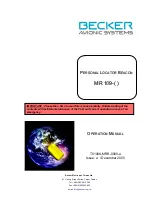
LA000605D © 2007 Navman New Zealand. All rights reserved. Proprietary information and specifications subject to change without notice.
5.2.2 Push-to-Fix mode
Unlike TricklePower, the operation in this mode is not cyclic. This mode always forces the
GPS software to revert to a continuous sleep mode after a navigation position fix. It will stay
in sleep mode until woken by wakeup input, and compute a fresh position.
If the ephemeris data become invalid or new satellites come into view, the RTC has the ability
to self activate and refresh the data, thus keeping the restart TTFF very short.
This mode yields the lowest power consumption of the module, and is ideal where a battery
powered application requires very few position fixes.
For further information on the TricklePower and Push-To-Fix modes refer to the Low Power
Operating Modes application note (LA000513).
5.3 Serial I/O
The module can output serial data in the NMEA format or SiRF Binary format. The serial I/O
protocols are defined in the Navman NMEA reference manual (MN000315) and the SiRF Binary
Protocol reference manual. These describe the format of the serial data from the module, as well
as the structure of the commands. Navman has provided additional functionality to the NMEA
protocol as detailed in the following sections.
5.3.1 Default settings
The default protocol is NMEA, at a baud rate of 9600bps. The frame format is 8 data bits, no
parity bit and 1 stop bit.
The following messages are output by default, at a rate of once per second each:
$GPGGA, $GPGLL, $GPGSA, $GPGSV, $GPRMC, $GPVTG, $GPZDA
All output messages have checksums by default.
5.3.2 NMEA input commands
All NMEA input commands are in the form:
$PSRFxxx,…[*CS]<cr><lf>
where xxx is a decimal number between 100 and 255 (inclusive).
Note:
In each case, CS represents an NMEA checksum. This checksum is detailed in the
Navman NMEA reference manual MN000315.
Acknowledgements
All input commands other than the standard SiRF commands will be acknowledged with a
sentence of the form:
$PTTK,…*CS
Where the arguments provided to a command are invalid, the response will be the message:
$PTTK,NACK*CS
Checksums
All input commands are accepted whether or not they include a checksum, however if a
checksum is included it must be correct in order for the message to be accepted.
Incorrect checksums will result in the response:
$PTTK,CHECKSUM*CS
Unused messages
Input messages where the message ID is not between 100 and 255, or where the message
ID does not correspond to a specified function, result in the response:
$PTTK,INVALID*CS






































